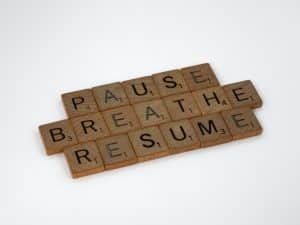
You’re a smart person, right? Yeah, for sure. Super smart. You’ve got a great brain, and you know how to use it. You trust that brain. It helps you makes sense of the world around you, cranks out thoughts, and more than occasionally – I’m guessing – creates a fresh idea or two (or ten). It’s the generator, processor, and center of everything. It’s where you turn when you’re confused, curious, or inspired. What’s not to love, right?
Hmmm…love. That’s a feeling…and those are less reliable than thoughts, right? Those are mushy, and weak, and sometimes scary. They’re not for smart people. So back to that brain…
If you’re reading this, the odds are good that you spend a fair amount of your time in business, academia, or some other kind of training, coaching or instruction. Your brain isn’t just your BFF, it’s your moneymaker. You have to trust it, or you’d be SOL. You wouldn’t be who you are.
Slight issue with that equation, though. It’s about one of the variables…the big one. That brain again. It might not be exactly what you think it is. In other words, it isn’t you. Or not all of you, anyway. And it isn’t completely, 100% reliable.
I know it sounds weird, but here’s the thing. You have plenty of thoughts that aren’t true. They’re either intentionally or unintentionally created by that amazing brain. Sometimes they’re useful, and sometimes they aren’t. They come in the form of brainstorming, problem-solving, and imagination, not to mention also judgment and self-criticism. Whether intriguing, distracting, or both, thoughts are abundant. However, just because they’re around a lot doesn’t mean they’re right, or even real.
You can think something that isn’t true, but you can’t feel something you don’t feel, or vice versa. We don’t always like our feelings, but at least in the moment we experience them (about 90 seconds, actually), they are real. They’re the most honest thing you can encounter. They’re either there, or they aren’t. Your mind can try to talk you out of an emotion, or reason around it, but it can only try to do that if it’s actually there to begin with – if it’s actually real, like it or not.
This isn’t to say that you should always respond to every emotion you experience. In fact, mindfulness is about finding the space to decide what to do with what you feel. With the self-awareness that mindfulness helps cultivate, we start to notice patterns in how we emotionally respond to different types of situations, which not only empowers us to choose how/if to act, but may eventually start to shift those response patterns. So, it’s not that emotions rule, necessarily, but they are beautifully – and sometimes, brutally – honest.
So, what does this mean for those among us who love to live in our brains? Well, no one’s evicting you. You need the thing, after all, and also, you don’t have a choice. You can’t be in the world without it. It does mean (in your brain’s terms) there’s some data you’ve been missing, though.
Just as mindfulness strengthens our ability to notice thoughts without engaging with all of them, it also equips us to be honest about the emotions we feel, without judging, struggling, or denying what’s going on. You can observe them, and maybe even learn from them, before – just like a thought – they pass and the memory of them slowly fades.
The idea of valuing the rational over the emotional isn’t a new one. As super-smarty Descartes famously said centuries ago, “I think, therefore I am.” What (I think) he meant by that is more like, “I’m aware of myself, therefore I am.” That awareness can come in many forms, including a real connection to how you feel.
Emotions are your body’s way of letting you know what’s really going on with you. Like any information, what you do with it is up to you. When you’re mindful, you can make choices about that. When you’re not, you’re more likely to respond reflexively – maybe authentically, but not with intention. When you ignore your emotions altogether, well that’s just denial, honey. It may give you a false sense of control, but it won’t make them go away. In fact, the more you try to manage them instead of just observing and making space for them, the more likely they are to settle in and make themselves at home for a longer stay within you.
If you want some ideas, ask your brain, but if you want the truth, ask your heart. It won’t lie to you – true story.
Photo credit: Lukasz Szmigiel




2 thoughts on “All the feels”
Pingback: “No-Fail” Friday: Duly noted | MindfulMBA
Pingback: “No-Fail” Friday: Duly noted | MindfulMBA